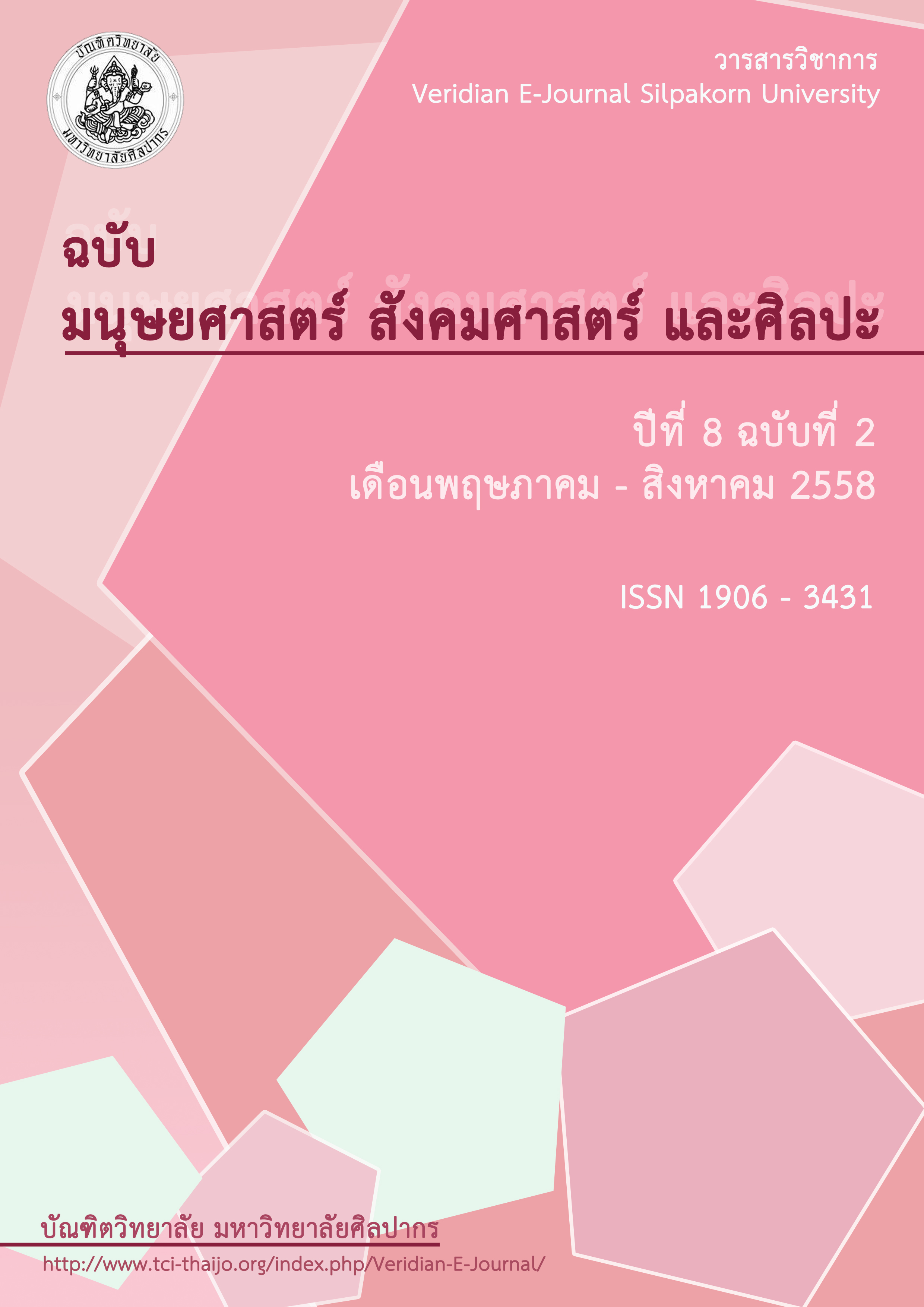การพัฒนาความสามารถในการคิดแก้ปัญหา ของนักเรียนชั้นมัธยมศึกษาปีที่ 6 โดยการจัดการเรียนรู้ ด้วยเทคนิคการแก้ปัญหาอนาคตร่วมกับแผนผังความคิด
Main Article Content
Abstract
บทคัดย่อ
การวิจัยครั้งนี้เป็นการวิจัยแบบ Pre – Experimental Design มีแบบแผนการวิจัย แบบหนึ่งกลุ่มทดสอบก่อนทดสอบหลัง (One Group Pretest Posttest Design) โดยมีวัตถุประสงค์ของการวิจัยดังนี้1) เพื่อเปรียบเทียบผลการเรียนรู้เรื่องมนุษย์กับความยั่งยืนของสิ่งแวดล้อม ของนักเรียนชั้นมัธยมศึกษาปีที่ 6 ก่อนและหลังการจัดการเรียนรู้ด้วยเทคนิคการแก้ปัญหาอนาคตร่วมกับแผนผังความคิด 2) เพื่อศึกษาพัฒนาการของความสามารถในการคิดแก้ปัญหาของนักเรียนชั้นมัธยมศึกษาปีที่ 6 ที่จัดการเรียนรู้ด้วยเทคนิคการแก้ปัญหาอนาคตร่วมกับแผนผังความคิด และ 3) เพื่อศึกษาความคิดเห็นของนักเรียนชั้นมัธยมศึกษาปีที่ 6 ที่มีต่อการจัดการเรียนรู้ด้วยเทคนิคการแก้ปัญหาอนาคตร่วมกับแผนผังความคิด กลุ่มตัวอย่างที่ใช้ในการวิจัย คือ นักเรียนชั้นมัธยมศึกษาปี6/2 ภาคเรียนที่ 2 ปีการศึกษา 2557โรงเรียนบางลี่วิทยาจำนวน 38 คน เครื่องมือที่ใช้ในการวิจัยครั้งนี้ ได้แก่ 1) แผนการจัดการเรียนรู้ ที่จัดการเรียนรู้ด้วยเทคนิคการแก้ปัญหาอนาคตร่วมกับแผนผังความคิด 2) แบบทดสอบวัดผลการเรียนรู้เรื่องมนุษย์กับความยั่งยืนของสิ่งแวดล้อม 3) แบบประเมินความสามารถในการคิดแก้ปัญหา และ 4) แบบสอบถามความคิดเห็น การวิเคราะห์ข้อมูลใช้ค่าเฉลี่ย () ส่วนเบี่ยงเบนมาตรฐาน (S.D.) การทดสอบค่าที (t-test dependent) และ การวิเคราะห์เนื้อหา (Content analysis)
ผลการวิจัยพบว่า 1) ผลการเรียนรู้ เรื่องมนุษย์กับความยั่งยืนของสิ่งแวดล้อม ของนักเรียนชั้นมัธยมศึกษาปีที่ 6 หลังการจัดการเรียนรู้ด้วยเทคนิคการแก้ปัญหาอนาคตร่วมกับแผนผังความคิดสูงกว่าก่อนเรียนอย่างมีนัยสำคัญทางสถิติที่ระดับ .05 ซึ่งยอมรับสมมติฐานการวิจัยทีกำหนดไว้ โดยหลังการจัดการเรียนรู้นักเรียนมีผลการเรียนรู้เรื่องมนุษย์กับความยั่งยืนของสิ่งแวดล้อม สูงกว่าก่อนการจัดการเรียนรู้ 2) พัฒนาการความสามารถในการคิดแก้ปัญหาของนักเรียน ที่จัดการเรียนรู้ด้วยเทคนิคการแก้ปัญหาอนาคตร่วมกับแผนผังความคิดมีพัฒนาการของความสามารถในการคิดแก้ปัญหา สูงขึ้นตามลำดับ 3) ความคิดเห็นของนักเรียน ที่มีต่อการจัดการเรียนรู้ด้วยเทคนิคการแก้ปัญหาอนาคตร่วมกับแผนผังความคิด ภาพรวมอยู่ในระดับมาก
Abstract
This research was Pre – Experimental Design with One Group Pretest Posttest Design by the purposes of the research were 1) to compare learning outcomes on Human and Environmental Sustainability of Mutthayomsuksa 6 students before and after the instruction with Future Problem Solving Technique and Mind mapping, 2) to study Mutthayomsuksa 6 students’ problem solving thinking abilities development after the instruction with Future Problem Solving Technique and Mind mapping,and 3) to study the students’ opinions towards the instruction with Future Problem Solving Technique and Mind mapping.The sample was 38 Mutthayomsuksa 6 class 2 students of Bangliwitthaya School in the second semester of 2014 Acadamicyear.The research instruments used for gathering data were 1) lesson planstowards the instruction with Future Problem Solving Technique and Mind mapping, 2) learning outcome test, 3) evaluation form of problem solving thinking abilities and 4) questionnaire on opinions.The statistical analysis were mean, standard deviation, t-test dependent and content analysis.
The results of the research were, 1) The learning outcomes on Human and Environmental Sustainability of Mutthayomsuksa6 students after the instruction with Future Problem Solving Technique and Mind mapping higher than before had a statistically significant at the level of .05, whereas the learning outcomes after the implementation were found higher than before the implementation, 2) the development of Mutthayomsuksa6 students’ problem solving thinking abilities after the instruction with Future Problem Solving Technique andMind mapping were gradually increased in each lesson plans, 3) the students’ opinions towards the instruction with Future Problem Solving Technique and Mind mapping were at a high agreement level,an the aspects of learning environments were perceived at a very high agreement level, learning activities and learning usefulness were perceived at high agreement level respectively.

